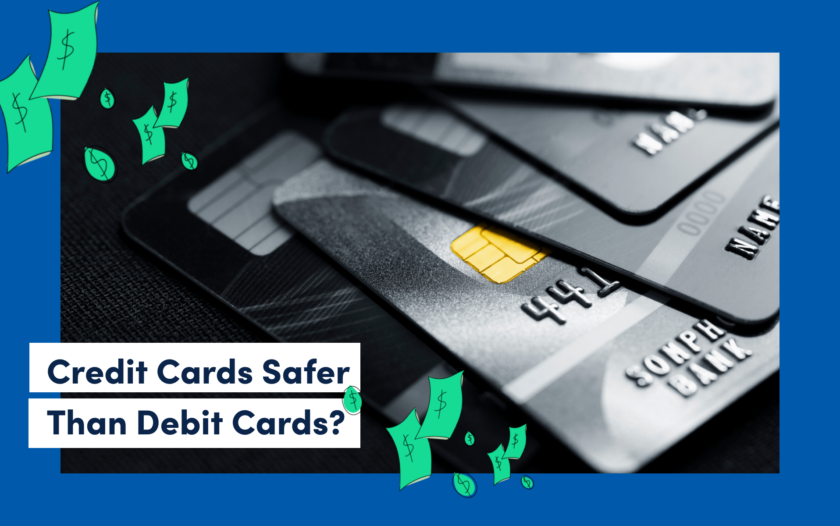Which is Safer: Debit or Credit Cards?
About Harrison
Harrison Pierce is a writer and a digital nomad, specializing in personal finance with a focus on credit cards. He is a graduate of the University of North Carolina at Chapel Hill with a major in sociology and is currently traveling the world.
Read full bio
At a Glance
Among the variety of cards available, debit and credit cards stand out as two of the most commonly used options. Both offer convenience and flexibility, but when it comes to safety, which one should you choose? Let’s get into the differences between debit and credit cards, examine their advantages and disadvantages, and help you make an informed decision on which card type to use to keep your financial well-being intact.
In this article, you’ll learn:
54%
of people pay with a bank account pay for purchases using a physical or virtual debit card.


Difference between debit and credit card
Before we explore the safety aspects, let’s clarify the fundamental distinctions between debit and credit cards.
Debit Card:
- Linked to your bank account.
- Allows you to spend only the funds available in your account.
- Generally, doesn’t contribute to building credit history.
- Limited liability for fraudulent transactions.
- Real-time transaction tracking.
Credit Card:
- Provides a line of credit from the issuing bank.
- Allows you to spend money up to the credit limit.
- Contributes to building credit history.
- Enhanced protection against unauthorized transactions.
- The grace period before interest accrues if the balance is paid in full.
Which is better to use: A credit card or a debit card?
1. Keep your money safe
Credit cards often have an edge when it comes to keeping your money safe. Most credit card issuers offer zero liability protection, meaning you won’t be held responsible for unauthorized charges. In contrast, while debit cards also provide some protection, it might take more time to recover funds and resolve disputes.
2. Dispute credit card charges
Credit cards offer a robust mechanism for disputing charges. If you encounter a fraudulent or erroneous transaction, you can file a dispute with your credit card company, and they will investigate the matter. During the investigation, the disputed amount is typically not included in your balance, providing you with temporary relief.
3. Purchase-related benefits
Credit cards often include additional benefits, like extended warranties, purchase protection, and travel insurance. These perks can offer valuable safeguards when making significant purchases, giving you peace of mind.
4. Build credit
Using a credit card responsibly can help you build and improve your credit score over time. By making consistent, on-time payments and maintaining a low credit utilization ratio, you demonstrate to creditors that you are a reliable borrower. Debit cards, on the other hand, do not contribute to your credit history.
5. Earn rewards
Credit cards frequently offer rewards programs that allow you to earn cash back, points, or miles on your purchases. These rewards can add up over time and provide valuable incentives for using your credit card for everyday expenses. Debit cards typically do not offer the same level of rewards.
Should you use a debit or credit card?
The choice between using a debit or credit card largely depends on your financial habits, goals, and risk tolerance. If you are concerned about overspending or want to avoid the possibility of accumulating credit card debt, a debit card may be a suitable choice. On the other hand, if you value additional layers of security, want to build credit, and take advantage of rewards, a credit card could be more beneficial.
FAQs
Avoid using your debit card when security might be compromised, like at unfamiliar or unsecured websites or ATMs located in remote or poorly lit areas. Skimming devices and other forms of fraud can put your funds at risk.
Consider using your credit card for larger purchases, online transactions, and when traveling. Credit cards offer extra protection and rewards, making these situations more secure and financially advantageous.
Debit cards are suitable for everyday expenses and ATM withdrawals. Use them when you want to spend only what you have in your bank account.
The major disadvantage of using a debit card is that it doesn’t provide the same level of protection against fraud and unauthorized transactions as credit cards do. If your debit card information is compromised, your funds could be at risk until the issue is resolved. You also leave money, in the form of points and miles, on the table when using a debit card.
Tapping your debit card, also known as contactless payment, is generally safe and convenient for small transactions. However, keeping your card secure and monitoring your transactions regularly is essential to identify any unauthorized use.









